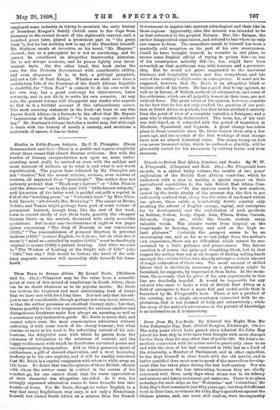Three Years in Savage Africa. By Lionel Decle. (Methuen and
Co. 21s.)—Whatever may be the value from a scientific point of view of this record of wanderings in South Africa, there can be no doubt whatever as to its popular merits. Mr. Decle has written the brightest and most entertaining book of travel that we have met with for a long time. It is not only that his sub- ject is one of considerable, though perhaps not very novel, interest, or that the author possesses an excellent literary style ; but that, thanks possibly to his own temperament, his extreme candour and disingenuous frankness make him always an amusing as well as a sometimes very instructive guide. Mr. Decle is never dull, and cannot relate even the most commonplace adventure without endowing it with some touch of his cheery humour ; but what charms us most in his work is the refreshing naivete of his con- fessions, the delightful ease with which he passes from the extremes of tribulation to the extremes of content, and the happy recklessness with which he distributes unstinted praise and uncompromising denunciation. Add to this a generous spirit of enthusiasm, a gift of shrewd observation, and a most becoming modesty as to his own exploits, and it will be readily conceived that Mr. Decle is a capital companion with whom to while away an idle hour. No doubt that was the opinion of those British officials with whom the author came in contact in the course of his wanderings, for one cannot think that his warm appreciation of their character was altogether one-sided. As it was, his strongly expressed admiration seems to have brought him into trouble at home. For Mr. Deck, though he writes English in a way that many Englishmen may envy, is not only a Frenchman himself, but visited South Africa on a mission from the French Government to inquire into matters ethnological and their like in those regions. Apparently, also, the mission was intended to be as that entrusted to the prophet Balsam. But, like Balsam, the author disappointed expectation, and refused to ban where he only saw reason to bless. The immediate result to himself has been a markedly cold reception on the part of his own countrymen. Could he have brought himself, he remarks in one place, to accuse some English official of trying to poison him—as one of his countrymen actually did—he, too, might have been rewarded, as that gentleman was, with honours and a governor- ship. But he would not prove ungrateful to the universal kindness and hospitality which met him everywhere, and has earned his country's displeasure in consequence. It must not be supposed, however, that Mr. Decle is an altogether blind or lenient critic of his hosts. He has a good deal to say against, as well as in favour, of British methods of colonisation, and some of his criticisms, which are all palpably honest in their tone, are not without force. The great value of his opinion, however, consists in the fact that he has not only studied the question of our posi- tion in South Africa as a whole, but that he has studied it entirely from the point of view of a complete outsider, a foreigner, and a man who is absolutely disinterested. The hour, too, of his visit was well timed, as it coincided with the period of transition in Rhodesia, Nyasaland, and Uganda. A great change has taken place in those countries since Mr. Decle visited them only a few years ago, and his account of the first workings of that change have now an almost historical value. The weary tramp on foot over seven thousand miles, which he endured so pluckily, will be pleasantly varied for his successors by railway trains and river steamers.


































 Previous page
Previous page